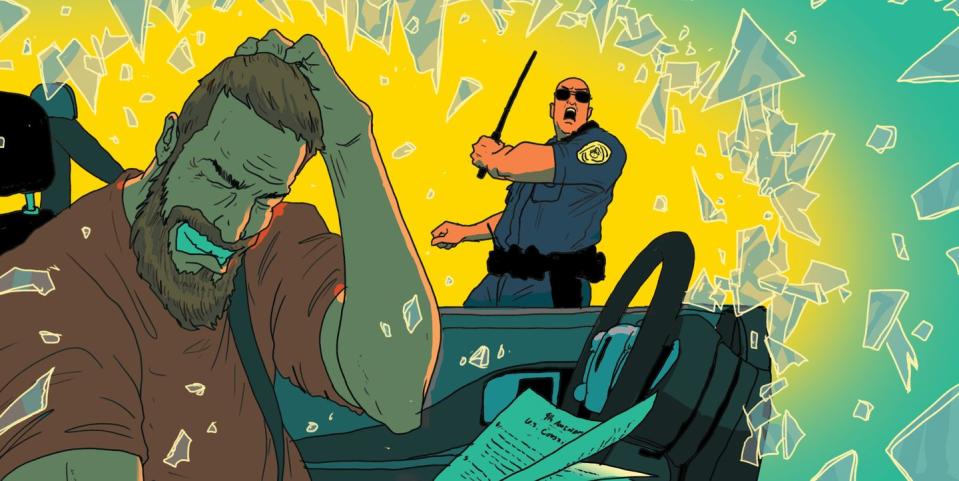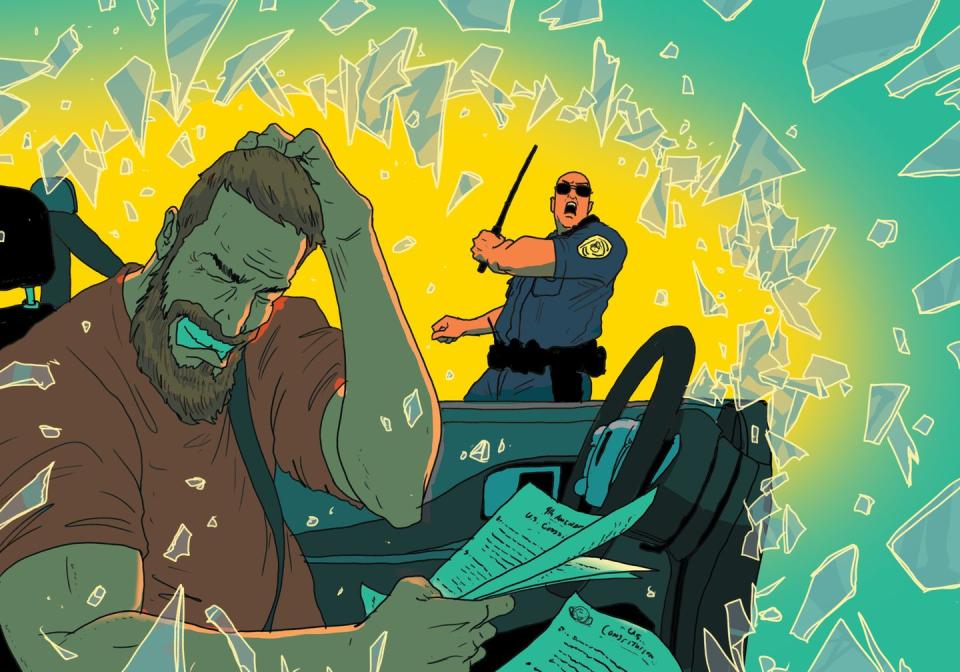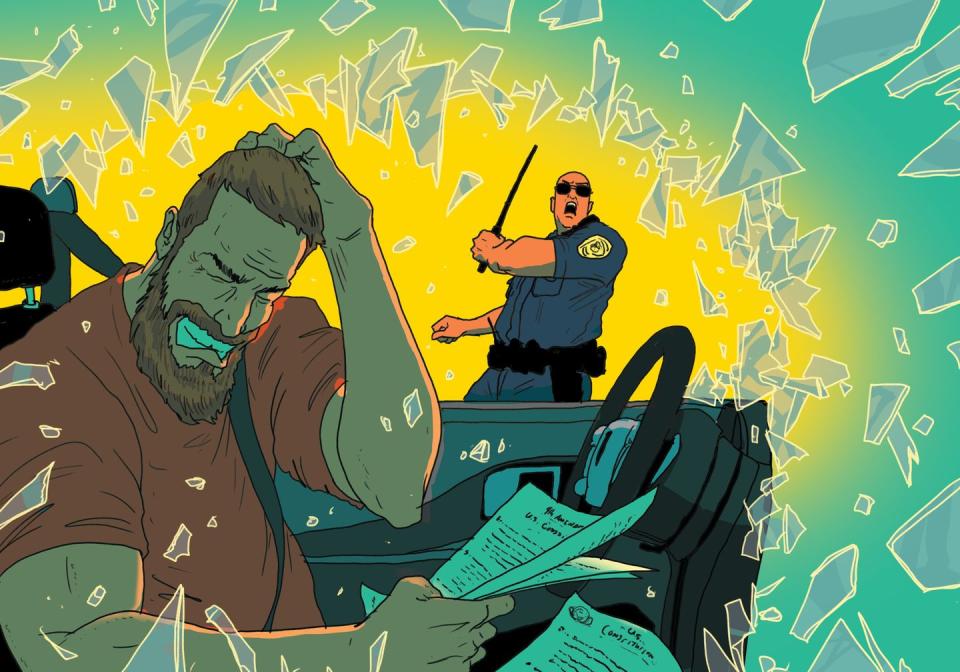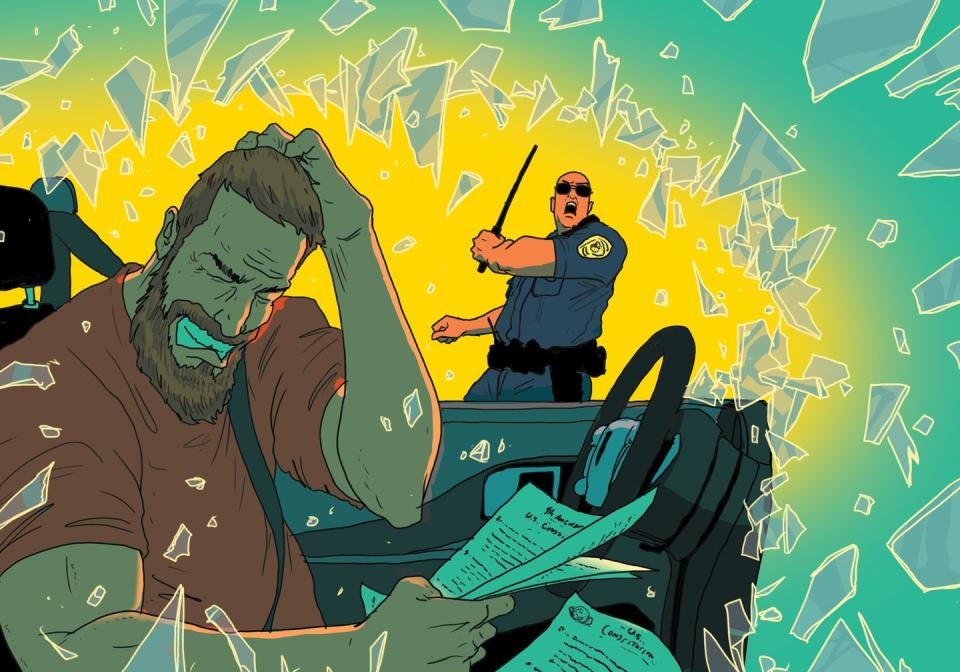Sovereign Citizens Take Their Anti-Government Philosophy to the Roads

On a sunny fall day in 2014, a civilian by the name of Gavin Seim initiated a traffic stop in Grant County, Washington. "You're not allowed to have patrol cars that are unmarked," Seim told deputy Dustin Canfield, who was indeed sitting in an unmarked white Dodge Charger. "Are you aware of that, under Washington State RCW?" Seim was polite but firm, righteous but ultimately magnanimous. "I'm not gonna write you up today," he said to Canfield. The officer flashed a look as incredulous as amused.
The exchange played out like a roadside twist on Trading Places. Later Seim would post video of the incident to YouTube. It has earned 5.9 million views as of this writing. It's kind of, sort of, somewhat, a bit legendary. Just a regular guy telling a police officer he's not going to give him a ticket. That'll get you noticed.
In recent years, many civilians have felt emboldened to question the police, their handling of situations, and their use of force. But however you feel toward law enforcement, it's hard to deny that they have authority. That is, unless you have accepted sovereign citizen ideology. It's kind of a movement. And kind of not.
Sovereign citizens, as defined by the FBI, are "anti-government extremists who believe that even though they physically reside in this country, they are separate or 'sovereign' from the United States." As such, sovereigns object to (and often do not comply with) government authority, including law enforcement, courts, taxing entities, and motor vehicle departments. It's only notionally a movement in that there's no hierarchy leading it, no set texts defining it, no formal goals for it to achieve, and nothing much holding it together other than a belief that the current government exists in betrayal of the Constitution.
Though Seim rejects the sovereign label and asserts an ideological divide from it, he sympathizes with the cause, espousing anti-government views as a "liberty speaker." His video is one of many recorded interactions between police and moralizing people attempting to take a stand against perceived government overreach. For most of us, if we know anything at all about the sovereign citizen movement, that knowledge doesn't extend much beyond the videos of self-righteous provocateurs along the roadside spewing legalistic gobbledygook at exasperated traffic cops.

And that's for good reason. According to Sarah Seo, an associate professor at the University of Iowa College of Law and the author of Policing the Open Road: How Cars Transformed American Freedom: "It's not at all surprising that where sovereign citizens interact with the police is in their cars. Almost all citizens' interactions with police take place in the context of cars."
On the road, sovereign thought is expressed as the "right to travel." In this, acolytes believe that people don't need driver's licenses, license plates, vehicle registrations, or insurance to traverse the country's highways. To reach this conclusion, sovereigns often draw a distinction between being able "to drive," which they say is the privilege of using a vehicle to conduct commercial activity, and being able "to travel," which they assert is a right inherent in the Constitution.
The website FreedomFromGovernment.org offers a sovereign-friendly explanation of the asserted right to travel that runs some 30,000 words long, including citations. Multiple attempts to contact Trent Goodbaudy, a writer who apparently runs the site, were unsuccessful. But the online store linked to the site sells a set of replacement license-plate tags proclaiming that the vehicle is private, traveling without commercial purpose, and not subject to insurance or licensing requirements. They cost C/D$39.95. No one in the office has volunteered to mount them to their vehicle.

THE ORIGIN
"Where these allegedly binding definitions come from is a varied and often perplexing matter," writes Caesar Kalinowski IV, a Seattle attorney who recently confronted sovereign legal claims in the Montana Law Review. "Sovereign Citizens often cite the U.S. Constitution, the [Uniform Commercial Code], the Magna Carta, the Articles of Confederation, and numerous other quasi-legal documents to support their assertions. Although authoritative sounding, the true basis for a citizen's constitutional rights is found in the Constitution itself. The U.S. Supreme Court is the only legal body that can interpret and give legal effect to the Constitution. Accordingly, Sovereign Citizens' citation to—and reliance on—dictionaries, state-court opinions, specific capitalization, or state records are misplaced and unavailing."
Seim's reprimand of deputy Canfield is a good example of this. Though he seems well informed, his interpretation of the law is misguided. After the video went live, Grant County sheriff Tom Jones took to Facebook to explain that even if the cruiser was in violation of the state law cited by Seim, there's no ticket to write or arrest to make. That particular law requires such violations to be handled by an agency head. It's administrative. Nothing more.
"The internet has made it a lot easier for people to feel they're getting authoritative information, when in fact it's just some person sitting in their house espousing what they believe," Kalinowski says. And the ideology sprouts from eccentric interpretations of the Constitution. It often includes religious elements seasoned with minutiae from ancient legal cases and broad appeals to individual freedom.
Sovereign citizens have several explanations of where America went wrong, but the basic thinking argues that, at some point, popular sovereignty was abandoned in favor of admiralty law—the law of the sea and international commerce. According to the Southern Poverty Law Center: "Under common law, or so they believe, the sovereigns would be free men. Under admiralty law, they are slaves, and secret government forces have a vested interest in keeping them that way." And so sovereigns assert that when they are tried at a court flying an admiralty flag (i.e., an American flag with gold fringe), said court holds no jurisdiction over them and the case should be dropped.
Further, that "some point" where the U.S. forfeited its legitimacy is in dispute. Many sovereigns maintain it was with the ratification of the 13th and 14th Amendments. According to Kalinowski, "Sovereign Citizens believe that the Thirteenth Amendment, which outlawed slavery, caused problems for the federal government because up until that point, 'slaves were not citizens of any state or country, because they were just property, and property did not have citizenship.' To rectify this problem, according to Sovereign Citizens, the Fourteenth Amendment was ratified so as to create 'a new class of citizenship.' This new citizenship was a 'privilege' granted by the federal government, unsupported by the 'sovereign inalienable right.' "
And that's not the only theory. Others date it to the passage of the 16th Amendment, which allowed the institution of an income tax. Yet another sovereign theory pegs it at 1913, with the creation of the Federal Reserve. Or maybe it was in 1933, when the U.S. went off the gold standard. If this all sounds like free-form pseudoscholarship, that's because it is. A creative riff on history can attract followers, and because there is an entrepreneurial edge to sovereign culture—sovereigns aren't shy about selling anything or everything, whether it's seminars, bumper stickers, books, or flat-out pleas for cash on YouTube—followers are also customers. And theories are changed and updated constantly.

THE PERIL
Whatever the origin, sovereign ideology has gained traction in the past decade, in part due to videos like Seim's. That video is something of an oddity. The civilian flags down the officer, not the other way around, and everyone remains calm—no voices raised, no weapons drawn. Some roadside interactions with sovereign thinkers don't proceed so peacefully.
In May 2010, police officer Bill Evans attempted a late-morning traffic stop of a ratty-looking Plymouth Voyager headed east on I-40 in West Memphis, Arkansas. After the minivan pulled off and parked, Evans's backup, Sergeant Brandon Paudert, arrived. In the van sat Jerry Kane Jr., 45, and his 16-year-old son, Joseph.
Jerry Kane made his living holding debt-elimination seminars based on the sovereign idea that one's "real self" is distinct from the "corporate self" established back when America sold its citizens' futures under admiralty law. Judging by the old Plymouth he was driving—which was registered to the House of God's Prayer in New Vienna, Ohio—his success with the seminars was modest.
Reinforcing each other's paranoid view of the government, both Kanes were rapt by sovereign conspiracy theories. And as Evans attempted to frisk the elder Kane, the teenage Kane came out firing an automatic weapon. Evans and Paudert were murdered. A couple hours later, trapped in a Walmart parking lot, the Kanes were killed in a shootout with police.
In 2012, California Highway Patrol officer Kenyon Youngstrom was shot and killed while performing a traffic stop of a Jeep with an obstructed license plate belonging to Christopher Boone Lacy. Another CHP officer shot and killed Lacy. A subsequent investigation revealed that Lacy had been diagnosed as bipolar and had downloaded a lot of sovereign literature.

STOPPING POINT
As for Seim—who, remember, rejects the sovereign label—after theatrically contending for his ideas, being hauled into (and literally out of) court several times, he has opted out of America altogether. Believing the government he was trying to keep honest was out to get him and his family, he moved to Mexico. He says he'll stay there, away from the fray.
"The reality," Seim says, "is that the government is taking the term 'sovereign' and throwing it at anyone who doesn't, when they see a cop, say, 'Yes, sir. Thank you. Have a good day. Thank you for your service.' That's really what it amounts to."
Labels fade, and yet the ideas can persist, sold under new brands. There are fringe ideologies coming out of the cultural kiln all the time, and snake oil has always lubricated American culture. With the development of online subcultures, it's easier than ever to find like-minded malcontents ready to support even the kookiest ideas. "Hopefully one day this will peter out, and people won't be taken in by the snake oil anymore," Kalinowski says.
The homemade license plates and bumper stickers featuring sovereign slogans serve an unintended purpose. They give cops some warning about how the people in the vehicle they're approaching might react to law enforcement. Should these usual markers of sovereign citizenry fade, it will be that much more difficult to anticipate potentially violent interactions. That makes traffic stops even more treacherous for police and sovereigns alike.
"I understand that feeling of 'the government's encroaching,' " Kalinowski says. "[The idea that] the federal government doesn't represent them, doesn't understand them, and is trying to reach down into their lives in ways it shouldn't be. The problem is, these people think they've figured out a way around that. But it's actually causing them to have more interaction with the government. More negative interactions because they think they've found a talismanic phrase they can utter and get them out of all trouble. It never works out that way. There's no case where a sovereign citizen's case has been upheld."
Anti-government ideology is on the edge now, mostly expressed as arguments on the internet. But it will continue to come out where sovereign citizens most often confront government power: in cars, on roads, during traffic stops.
You Might Also Like

 Yahoo Autos
Yahoo Autos 